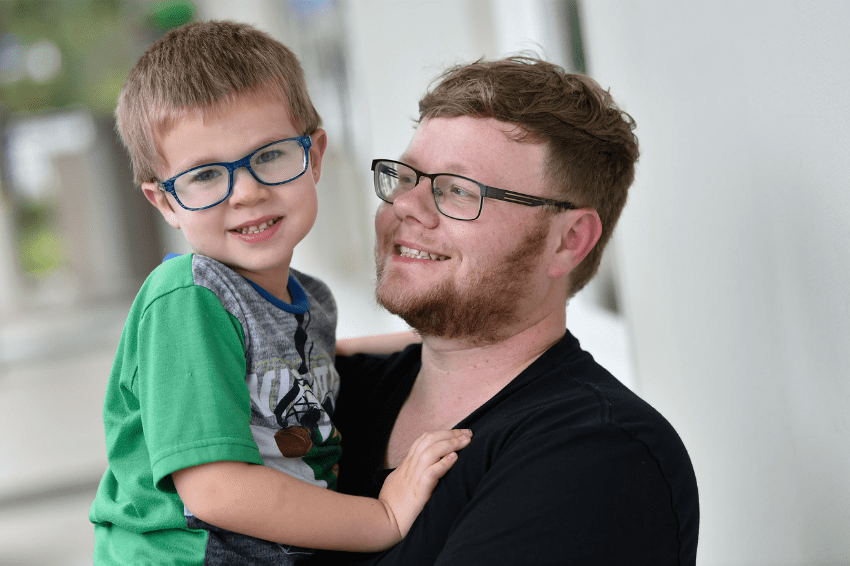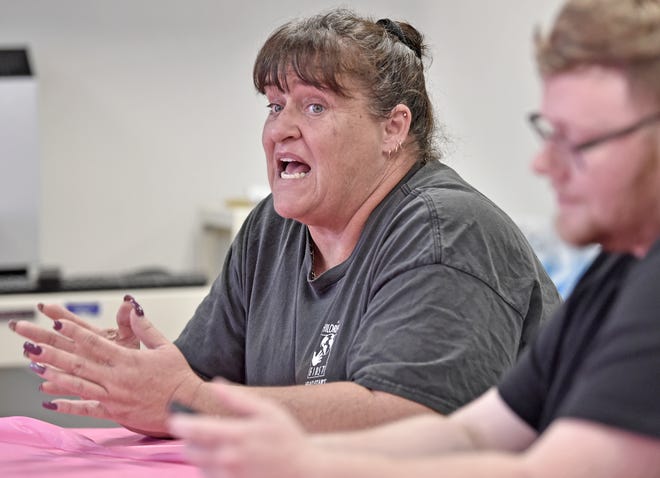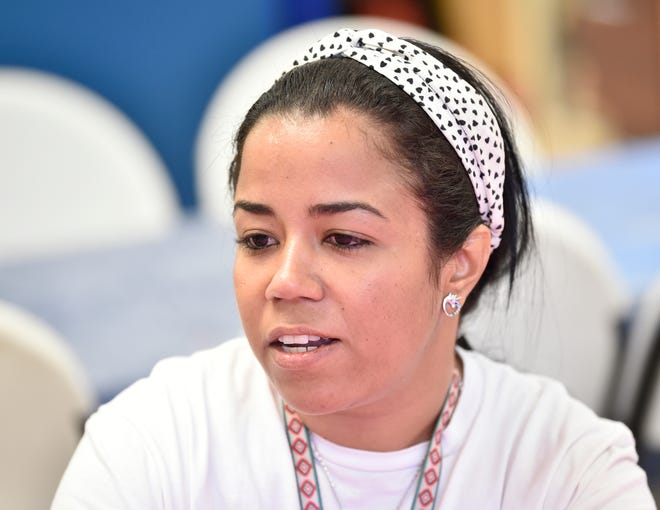
Wages, housing contribute to shortage of Sarasota-Manatee preschool teachers
Sarasota Herald-Tribune | By Saundra Armrhein | June 8, 2022
Laura Hatfield struggled with the decision to leave her job.
She fiercely loved teaching at an early learning center near Lakewood Ranch, where for more than 2 1/2 years she worked with infants during some of the most important periods of a child’s life.
She bonded with the families, helping to mold and understand the babies’ sleeping, eating, and play patterns.
Yet at the end of every month, a cold reality stared her in the face: despite holding down two full-time jobs, she and her husband were living paycheck to paycheck.
Rent for their one-bedroom Bradenton apartment had climbed from $1,041 to $1,340 in the two years they were there. Her salary – despite advanced training, a decade of experience and long hours pulled through the pandemic – was stuck at $12.50 an hour.
“I really agonized,” said Hatfield, 35, about breaking the news to the parents – knowing that they would have to scramble to search for openings somewhere else.
“I was even calling places trying to help them because I felt such a loyalty to them,” she said.
In March, she quit, along with four other teachers, and eventually the preschool closed – one of several to do so in the last few months.
Hatfield’s experience highlights a mounting crisis in early child care and education throughout the region.
An already underfunded industry is being crushed by soaring housing and gas prices – worsening a severe teacher shortage that is impacting both communities and the local economy.
The departure of teachers and extreme difficulties recruiting them here has caused early learning centers and preschools to cut or combine classrooms and nix summer programs. In turn, panicked parents are sent scrambling in search of scarce child care slots, forcing them to miss work, change career paths or endure hours-long daily commutes to the best option they can find.

Staffing problems
Early learning center directors – who must abide by regulations on teacher-child ratios and requirements on square footage – say even when they have space to take in more children and grants to hire more staff, everything hinges on getting qualified teachers in the classrooms.
“We spent thousands, I can’t even tell you how many, on Indeed, looking for people who we could hire,” said Lisa McLean, director of St. Paul Early Childhood Learning Center in Sarasota, about their recruitment efforts earlier this year for credentialed staff.
“I probably had to turn away, without exaggeration, 15 to 20 families,” she said of parents hoping to place their children at the school in the meantime.
When Hatfield applied, McLean said she snatched her up right away. After hiring one more teacher, the center finally, after seven months of trying, was fully staffed. The school is booked through the summer, with only three openings left in the fall.
“Parents are so desperate,” she said. “And I can’t even recommend other schools because nobody has spots.”
As for Hatfield, she’s relieved to know many of her old families eventually found new places for their children. She’s also happy at St. Paul, with its high quality and better pay. But given industry constraints on teacher salaries coupled with rising housing costs and gas prices, she’s only slightly better off.
“I don’t feel like I’m drowning anymore,” Hatfield added, “but it’s still very tight. I don’t think we could handle one emergency.”
Shortages and dreadful commutes
While Hatfield landed at another center, other early learning teachers are leaving the profession altogether or getting pulled away by the public school systems, center directors say. And replacements are few and far between.
“We are looking for those high-quality staff that want to not only nurture but also educate the children,” said Faithe Johnson, director of Grace Preschool in Venice. “It’s getting harder and harder to find those. That is compounded by the lack of housing in our area.”
Johnson recruits credentialed candidates from as far away as Punta Gorda and Bradenton. But after the interview process, qualified prospects discover they can’t afford the housing in the area. And rising gas prices make a commute too expensive.
Grace Preschool – which is accredited, offering lower than required teacher-student ratios and higher than industry-standard pay, as well as rare benefits and mental health days – was assisted this past school year by retention bonuses. The bonuses are being distributed by the Charles & Margery Barancik Foundation in conjunction with the Early Learning Coalition of Sarasota County. $475,000 was given out this past month alone.
The retention bonuses are part of the foundation’s Early Learning Initiative launched earlier this year as it seeks to transform the early-learning model itself – a model that locks teachers into low-wage jobs despite research demonstrating the critical role of a child’s first five years in cognitive and emotional development.
But while the grants helped Grace Preschool prevent a staff exodus, rising housing and gas costs caused some of its teachers to take on second jobs, even as staffing challenges forced the school to cut the number of classrooms from 13 to 12, Johnson said. This summer, they are going down to nine, while in the fall they will have only 10. The differences represent spots for dozens of children.
“It will cause a breakdown if parents are not able to have their children in quality care and have that peace of mind that they can go to school while parents go to their jobs,” Johnson said.

Women bear the burden
For parents, that breakdown more often than not falls on the shoulders of moms. Numerous reports show that the crisis in early child care – worsened amid center and school closures during the pandemic – particularly affects women, especially their careers and participation in the workforce.
For Emily Savoca, 38, of Nokomis, the shortage forced her to quit a dream job.
Several years ago, Savoca, who was working as a high school counselor while her husband was a firefighter with set shifts, was the point person to drop their two kids off at preschool. But with most centers opening after her work day started, she had to make a change.
“Because child care is so hard to find, it was easier for me to switch jobs, despite loving that job, than for me to find a child care provider I was happy with,” Savoca said. “In Sarasota, it doesn’t seem that there are enough quality child care providers.”
Savoca was lucky to find another more flexible job she ended up loving with a nonprofit in Venice. Then living in Sarasota’s Gulf Gate Estates, she and her husband placed their two children in St. Paul’s center in 2018. But upon the birth of their third child, they needed more space and bought a home they could afford in Nokomis, moving in 2020.
For the last two years – unwilling to relinquish the coveted spots at St. Paul’s for their three kids – Savoca endured a treacherous twice-daily commute between Nokomis, Sarasota and Venice.
“I am in the car a solid two or three hours every day,” she said.
With rising gas prices, they decided recently to jump on openings at a center closer to home – Savoca taking a day off work to tour and sign the two younger ones up right away for the fall, the oldest heading to elementary school.
“I do feel it is a quality place, but it is still very hard to move them because I’ve been with St. Paul for four years, and I know those staff members and those teachers, I can call them with problems,” she said. “You want to know that your kids are being loved on, wherever they are, especially in this age group.”
For the summer, she’s foregoing working altogether because the scarcity of affordable, quality full-time summer care and camps.
“It doesn’t make financial sense to work over the summer,” she said, “because I would spend more in child care than what I’m making working.”
Not glorified babysitters
The staff at Children First feels parents’ pain. It is the exclusive provider of Head Start and Early Head Start for Sarasota County, with 15 sites.
Due to staff shortages, Children First’s North Port center will not offer its optional Head Start care this summer, though Early Head Start will go on as planned.
As a sign of demand, there are about 250 kids on the waiting list for both programs at its 15 sites, said Evan Ackerman, Children First’s associate director of communications.
For more than six years, Children First has been strategically seeking funding opportunities to increase teacher staff salaries and benefits for its high-quality Head Start programs, which have some of the most stringent regulations and teacher-child ratios in the nation, said CEO Philip Tavill.
But recent inflation and skyrocketing rents – along with illnesses due to COVID-19 and restaurant and retail chains offering higher wages – have taken a toll on staffing.
“It’s just brutal,” he said.
At the start of the school year, Children First wasn’t able to open four out of 48 classrooms throughout the county. Since then they’ve been working to make it up. But they’ve had to move teachers around between sites; as soon as some are hired, others are leaving.
“It’s kind of like a moving target,” Tavill said.
Bright spots for parents
Amid the challenges, there are bright spots.
Several new centers and classrooms are opening soon – including more preschool classrooms at the YMCA in Venice, according to the Early Learning Coalition of Sarasota County.
Also, Baby Fox Academy of Sarasota, considered a high-quality preschool, is opening a second site this summer, this one in Lakewood Ranch, and will be taking in infants and toddlers – an age group for which the shortage in care is particularly dire.
What’s more, the coalition offers extensive initiatives to retain and attract teachers, aiming to develop a homegrown early learning workforce – from mentoring programs, to free teacher training, high school paid internships, grants, and partnerships with CareerSource and Suncoast Technical College.
Compounding staff shortages, said the coalition’s executive director Janet Kahn, are public misperceptions of preschool teachers as “glorified babysitters” who merely sing the ABCs at a daycare – stereotypes the coalition is actively trying to break to encourage greater social investment in the profession.
“The industry, as well as preschool teachers themselves, are too often overlooked, undervalued, and misunderstood by the public at large,” Kahn said. “They are credentialed and trained professional teachers who educate young children during the most crucial years of their lives.”
It’s a point that parents say they know at their core.

For that reason, Maria Rodriguez chose to scale back from working with her husband in their family business to be with their baby, who is on the waiting list for Early Head Start at the North Port site.
Instead of placing him into just any center, she’ll wait as long as she has to after seeing the difference that it made for their older son, who started there years earlier with an undetected hearing problem. The teachers realized what was wrong and provided the necessary extra support. He recently completed kindergarten.
“Had he not been here, he would have been struggling,” Rodriguez said. “Once your kid is here, you see that this is not a daycare. They are really raising children. They are raising families.”
Listening to Rodriguez and another parent share stories, teacher Trish Gualdoni-Hodson started to tear up.
For early learning teachers, she said, that is why they endure such hard times, and why decisions to leave are so wrenching. That powerful moment when you see something click in a child’s eyes, knowing they had a breakthrough that could shape the rest of their lives – makes it all worth it.
“That’s it, that’s why I’m here,” Gualdoni-Hodson said. “That’s why I think a lot of us are still here.”
This story comes from a partnership between the Sarasota Herald-Tribune and the Community Foundation of Sarasota County. Saundra Amrhein covers the Season of Sharing campaign, along with issues surrounding housing, utilities, child care and transportation in the area. She can be reached at samrhein@gannett.com.





